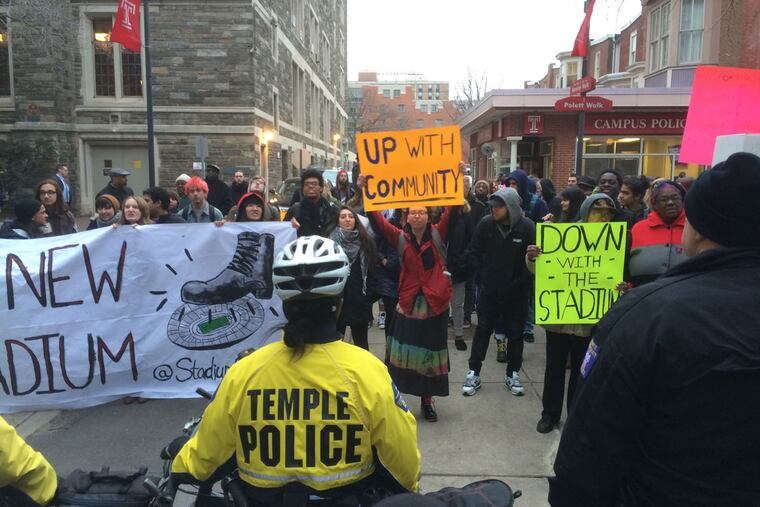Temple cracks down on off-campus alcohol violations
Temple University will crack down on underage drinking and partying in off-campus housing, partly in response to concerns from neighbors who have long complained about rowdy behavior affecting their North Philadelphia community.

Temple University will crack down on underage drinking and partying in off-campus housing, partly in response to concerns from neighbors who have long complained about rowdy behavior affecting their North Philadelphia community.
"This can't go on any longer," Temple president Neil D. Theobald said.
The new campaign, announced by Theobald on Tuesday, includes steep fines for underage drinkers and others violating alcohol-related laws. For the first time, Temple will levy fines of up to $1,500 on those who host nuisance parties, provide the alcohol, or have their name on the lease of a house where a party is held. Those students also could face suspension or expulsion.
In addition, teams made up of largely graduate students will walk the neighborhood during peak party times, from Thursday to Saturday evenings, the university said. A pilot team will begin patrolling this week, said Stephanie Ives, dean of students.
"In talking with neighbors about their concerns, student behavior surrounding off-campus parties is one of the biggest complaints I hear," said Joyce Wilkerson, Temple's senior adviser for Community Relations and Development.
Complaints from neighbors have gotten renewed attention from the university in recent months as it moves ahead with plans for a new football stadium. Some opponents of the stadium have cited long-standing concerns about trash, noise, parking, and partying in and around campus.
"Stronger measures to discourage underage drinking and un-neighborly behavior are quite frankly overdue, for the sake of both student safety and community respect," City Council President Darrell L. Clarke said. "This announcement is a welcome development, but it means nothing if not followed by measurable results."
Temple student Anna Barnett, an organizer with Stadium Stompers, which opposes the stadium, was skeptical.
"Temple's really sending a mixed message," said Barnett, 20, a junior from Jenkintown and a women's studies and Spanish major. "On one side, they're saying we need to respect the community, but on the other, they're building a stadium."
The number of Temple students charged with violations of the university's alcohol policy both on campus and off is on the rise. In 2013-14, 450 were charged and in 2014-15, there were 469, according to the university. As of March 18 with nearly two months left in the academic year, 470 students already have been charged.
Ives, who has been at Temple eight years, said alcohol-related vandalism, fights, assaults, and injuries have grown in off-campus housing as more students move into the neighborhood around the university. More than 13,000 students live in and around campus, she said, and only 5,500 of them are on campus.
"The issues that we're seeing off campus are these very serious complex alcohol-driven negative behaviors," Ives said. "They are causing extreme quality-of-life issues for the community."
Large house parties that draw more than 100 people and big outdoor gatherings have posed problems, said Charlie Leone, executive director of campus safety services.
"Sometimes it can look almost like a small Mardi Gras scenario," he said, noting that about 40 percent of those who attend are non-Temple students visiting their friends.
The conditions can be dangerous for students, he said. Earlier this year, an intoxicated student fell and suffered a brain injury, he said.
The new patrols, he said, primarily will cover west of the main campus from 15th to 19th Streets, and Susquehanna Avenue to Jefferson Street, where problems have occurred.
"Ever since I got to Temple, this has been a concern," Theobald said, vowing action.
In 2013, the year he became Temple's president, Theobald canceled the decades-old Spring Fling, in part because of excessive drinking. The decision came months after a West Chester University student accidentally fell to her death from a rooftop during an off-campus party at Spring Fling.
Universities vary in their handling of off-campus drinking.
West Chester University has fined students for violations at off-campus parties for many years, while Pennsylvania State University does not.
"We may issue citations for off-campus behavior, and also students who are found responsible for alcohol or drug violations are typically assigned to educational programs that do carry a fee with them," said Lisa Powers, Penn State spokeswoman. "But they are not fines."
Under the new enforcement, Temple students caught violating the alcohol policy will face higher fines for second and third offenses. (First offenses will remain at $250.) The second offense will rise to $750, up from $500, and the third offense will include a new fine of $1,000 in addition to possible suspension or expulsion.
Suspension or expulsion will be considered in cases involving property damage or disorderly conduct, Temple officials said. Also, the university will no longer waive fines if students are assessed a penalty by the city for the same incident.
Theobald said Temple will work with the city on the new effort, which could include pressure on landlords of houses that host drinking parties.
Ryan K. Rinaldi, 22, Temple student government president, said he initially opposed the increase in fines, concerned that they would overburden students already on a tight budget. But university officials have promised, he said, that they will consider the severity of an offense. There's a difference between quietly drinking a beer in a dorm and punching a hole in a wall, he said.
"I do believe the fines will be accordingly accurate to the severity of the situation," said Rinaldi, a senior finance major from Scranton.
The new effort also includes an education component about alcohol use, supported by Temple's student government.
Rinaldi said the education program will teach students to know and respect their personal limits.
215-854-4693@ssnyderinq